|
|
|
Sort Order |
|
|
|
Items / Page
|
|
|
|
|
|
|
| Srl | Item |
| 1 |
ID:
150183
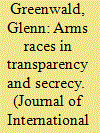

|
|
|
| 2 |
ID:
125946


|
|
|
|
|
| Publication |
2013.
|
| Summary/Abstract |
With secrecy a daily preoccupation of governments who routinely weigh security concerns over disclosure of covert operations, the balance of these two priorities becomes an ever more pressing national debate. We asked our panel of global experts what, if anything, they believe governments should or must keep secret.
|
|
|
|
|
|
|
|
|
|
|
|
|
|
|
|
| 3 |
ID:
138092
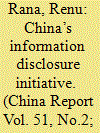

|
|
|
|
|
| Summary/Abstract |
This article examines the initiatives taken by the government of the People’s Republic of China towards ensuring government information transparency. The Open Government Information Regulations (OGI) which was adopted in 2007 is a landmark in the transparency reforms process in China. The analysis of this initiative and further reforms becomes vital as China has witnessed newly emerged emphasis on anti-corruption campaign and rule of law. Though these regulations were adopted in 2007 at national level, many reforms have been introduced in these regulations in terms of annual guidelines from time to time. This article analyses the origin and development of OGI; the scope of these regulations; the legal, political and structural problems obstructing the successful implementation of these regulations; and further reforms towards making China more open and transparent. This work also provides a comparative analysis of information disclosure initiatives in China and India.
|
|
|
|
|
|
|
|
|
|
|
|
|
|
|
|
| 4 |
ID:
189936
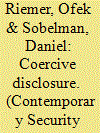

|
|
|
|
|
| Summary/Abstract |
Can intelligence serve as a coercive instrument in international relations? While coercion literature mostly addresses military and economic means, this article argues that coercion can also include the deliberate public disclosure of intelligence. Intelligence can be employed to threaten adversaries, reduce their latitude, and force them to adjust their plans and operations. Additionally, intelligence disclosure can be used to mobilize domestic and international audiences and make others align with a certain narrative and alter their policies accordingly. Still, coercive disclosure can fail or succeed only partially against a determined opponent or a target that is resilient to public and international pressure. To demonstrate the workings of coercive disclosure, we analyze Israel's campaign, beginning in 2017, against the Lebanese Hezbollah’s missile manufacturing program and Turkey's coercive campaign vis-à-vis Saudi Arabia and the United States following Jamal Khashoggi's assassination in 2018.
|
|
|
|
|
|
|
|
|
|
|
|
|
|
|
|
| 5 |
ID:
188388
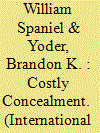

|
|
|
|
|
| Summary/Abstract |
This article presents a formal model that shows how states can credibly reassure each other simply by maintaining a cooperative outward narrative. The reassurance literature to date has focused largely on costly signaling, whereby benign states must distinguish themselves by taking specific actions that hostile types would not. The mere lack of overtly expressed hostility without costly signals has been considered “cheap talk,” on the assumption that this behavior is costless for hostile states and thus uninformative. In contrast, this paper argues that maintaining a cooperative façade while secretly formulating and executing exploitative policies carries inherent trade-offs, and thus constitutes a credible reassurance signal. Foreign policy planning and implementation requires communication among various individuals, groups, and organizations, which has some probability of being observed and punished by outside actors. Yet efforts to conceal the policymaking process and reduce this probability are costly—they require investments in internal monitoring and restrictions on internal communication that can substantially degrade policy outcomes. Thus, to the extent that a state's foreign policymaking process is transparent—that is, that concealing internal communications is difficult—the absence of positive signals of hostility is a credible signal of its benign intentions. The argument is illustrated with a case study of German reassurance signals during the July Crisis preceding World War I.
|
|
|
|
|
|
|
|
|
|
|
|
|
|
|
|
| 6 |
ID:
188251
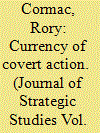

|
|
|
|
|
| Summary/Abstract |
At the start of the 1960s, the UK embarked on a programme of covert action in Latin America. This appears puzzling: the UK was overstretched; Latin America fell outside its area of strategic interest; and UK covert action was dwarfed by that of the US. After revealing this activity for the first time, this article argues that the UK turned to covert action for reasons beyond orthodox explanations of reducing threats in a plausibly deniable manner. Instead, policymakers recognised the currency of covert action in the Anglo-American relationship and in generating trade with emerging economies in Latin America.
|
|
|
|
|
|
|
|
|
|
|
|
|
|
|
|
| 7 |
ID:
111521
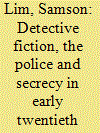

|
|
|
|
|
| Publication |
2012.
|
| Summary/Abstract |
The detective figure, literary and real, emerged in Siam between the late nineteenth and early twentieth centuries to bring clarity to increasingly complex social and political situations. In early detective fiction including the Seup saphakan [Investigating it All] (1892-97) and Nithan Thorng-in [The Tales of Thorng-in] (1904-05) series this was certainly the case - mysteries were solved, secrets revealed. In real life, however, the state's deployment of an army of detectives did not so much clarify as codify mysteries. This paper examines the links between the literary and the real detective, arguing that the appearance of detective fiction provided the vocabulary for understanding and dealing with social and political change in early twentieth century Siam.
|
|
|
|
|
|
|
|
|
|
|
|
|
|
|
|
| 8 |
ID:
184666
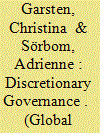

|
|
|
|
|
| Summary/Abstract |
Built on the exclusive funding of 1,000 large transnational corporations, the World Economic Forum is a not-for-profit Swiss foundation, aiming to shape the direction of globalization. Its events are characterized by low degrees of formality and transparency. Research on what this organization does is scarce. This article suggests the term discretionary governance to capture the precarious, yet existing, social order that the organization shapes. By discretionary governance, we mean a set of discreet practices based on the organization’s judgement in ways that escape established democratic controls. Drawing on ethnographic data the paper demonstrates how selection, secrecy, and status form key components of this tenuous ordering. Selection processes and secrecy contribute to status elevation of the individuals and organizations chosen to participate. Upon them and the organization itself is bestowed a symbolic capital that is practical and possibly profitable in the world of global governance.
|
|
|
|
|
|
|
|
|
|
|
|
|
|
|
|
| 9 |
ID:
108052
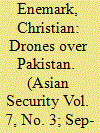

|
|
|
|
|
| Publication |
2011.
|
| Summary/Abstract |
The US government appears to be using drones to launch air strikes inside Pakistan. This article details uncertainties regarding the ethical soundness of these strikes and highlights the consequent need for greater official transparency. Available evidence is assessed in the light of traditional ethical requirements that the use of force is beneficial to a legitimate military objective, that it discriminates between combatants and noncombatants, and that it generates harm that is proportional to the expected military benefit. The murky picture that emerges is an inadequate foundation for determining whether US drone strikes in Pakistan constitute a just or an unjust use of force. Arguably, however, the very persistence of doubt on this point undermines international norms on the use of force and the reputation of the United States as a champion thereof. The US government should therefore either refrain from drone strikes or explain publicly how they are beneficial, discriminate, and proportionate.
|
|
|
|
|
|
|
|
|
|
|
|
|
|
|
|
| 10 |
ID:
173882
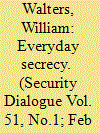

|
|
|
|
|
| Summary/Abstract |
Despite the welcome turn within security studies towards a more material- and practice-oriented understanding of state secrecy, the ways in which security actors experience, practise and negotiate secrecy in their everyday work lives has been rather overlooked. To counter this neglect the article calls for attention to everyday secrecy. Focusing on a former top-secret weapons research facility in the UK called Orford Ness, it uses oral history to give an account of ex-employees’ memories, experiences and practices concerning secrecy. Such a focus reveals that subjects make sense of procedures and rules of secrecy in ways that are sometimes surprising and unexpected. Ultimately this perspective emphasizes that secrecy is not just what governments and organizations prescribe and proscribe; it is also shaped by subjects who negotiate these rules. Everyday secrecy matters: as a perspective it shows that secrecy is not simply imposed by states and organizations from ‘above’; it is also made from ‘below’, albeit very asymmetrically.
|
|
|
|
|
|
|
|
|
|
|
|
|
|
|
|
| 11 |
ID:
183713
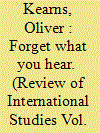

|
|
|
|
|
| Summary/Abstract |
As the covert and clandestine practices of states multiplied in the twentieth century, so did these practices’ footprint in public life. This footprint is not just visual and material but sonic and aural, sounding the ‘secret state’ into being and suggesting ways of ‘listening in’ on it. Using multisensory methodology, this article examines Careless Talk Costs Lives, a UK Second World War propaganda campaign instructing citizens on how to practice discreet speech and listening in defence against ‘fifth columnist’ spies. This campaign reproduced the British secret state in the everyday: it represented sensitive operations as weaving in and out of citizens’ lives through imprudent chatter about ‘hush-hush’ activities and sounds you shouldn't overhear. The paradox at the campaign's heart – of revealing to people the kind of things they shouldn't say or listen to – made the secret state and its international operations a public phenomenon. Secret sounds therefore became entangled within productions of social difference, from class inequalities to German racialisation. Sound and listening, however, are unwieldy phenomena. This sonic life of the secret state risked undermining political legitimacy, while turning public space and idyllic environments into deceptive soundscapes – for international espionage, it seemed, sounded like ordinary life.
|
|
|
|
|
|
|
|
|
|
|
|
|
|
|
|
| 12 |
ID:
196606


|
|
|
|
|
| Summary/Abstract |
The Trans-Atlantic Trade and Investment Partnership (ttip) underwent three years of negotiations by the EU and US, both experienced and capable negotiators, yet the negotiations failed, raising questions. This article delves into the factors that caused ttip’s demise by examining the negotiation structure, the impact of secrecy versus transparency, and the disruptive influence of spoilers. The change in negotiation structure caused a cascading effect, enabling disruptive actors to flourish, and causing the negotiators to switch from an integrative negotiation strategy into a distributive strategy. To enhance the chances of success and avoid similar pitfalls, this article presents recommendations: (1) maintaining a consistent negotiation structure, (2) coordinating any structural changes with the negotiation partner, (3) expanding the agreement’s scope to garner more internal political support, and (4) establishing political backing before commencing negotiations. By addressing these issues, future negotiations can mitigate risks and improve their chances of achieving desired outcomes.
|
|
|
|
|
|
|
|
|
|
|
|
|
|
|
|
| 13 |
ID:
167432
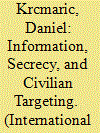

|
|
|
|
|
| Summary/Abstract |
Why do some states target civilians with violence whereas others exercise restraint? I argue regimes are more likely to victimize civilians when they believe that they can hide their actions and thereby avoid international and domestic blowback. This means that governments will prove less likely to commit atrocities in situations where information and communication technologies (ICTs) make secrecy and plausible deniability difficult. Statistical analyses provide strong support for this claim. The findings shed light on how ICTs shape violence and how states strategically employ secrecy.
|
|
|
|
|
|
|
|
|
|
|
|
|
|
|
|
| 14 |
ID:
106579
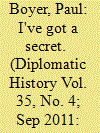

|
|
|
| 15 |
ID:
128530
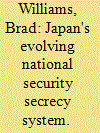

|
|
|
|
|
| Publication |
2013.
|
| Summary/Abstract |
This paper sheds light on a relatively unexplored component of Japan's security architecture: the national security secrecy system. Among the protection measures underpinning this system, particular attention is paid to the legal aspects. This system has been caught between two competing pressures. On the one hand, the United States and domestic conservative forces have consistently sought to strengthen what they consider to be an unsatisfactory system of safeguarding national security secrets in Japan. On the other, left-leaning political actors, the media and public opinion, informed by the norm of antimilitarism - understood as a deep distrust of Japan's military establishment and opposition to its foreign deployment, and also broadly predicated on fear of democratic retreat - have been able to thwart these attempts. As a result, Japan lacks a specific anti-espionage or state secrets law and has earned the reputation of a "spy heaven" where foreign agents, domestic collaborators and information leakers have been able to act with seeming impunity. However, rising bilateralism - under which Japan acts to consolidate alliance relations with its superpower patron - in the security and intelligence fields over the past decade and the subsequent pressures from the United States, a dissatisfied ally, facilitated by the rise of regional security threats and a shift in the domestic political terrain, have contributed to an incremental erosion of the antimilitaristic constraints on the legal component of Japan's security secrecy system. Japanese governments have moved to bolster the secrecy protection regime, although reforms are not as significant as what they would be absent residual antimilitarism.
|
|
|
|
|
|
|
|
|
|
|
|
|
|
|
|
| 16 |
ID:
100673
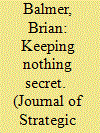

|
|
|
|
|
| Publication |
2010.
|
| Summary/Abstract |
After renouncing an offensive chemical warfare programme in 1956, the UK Cabinet Defence Committee decided in 1963 to re-acquire a chemical warfare retaliatory capability. This article describes how the re-acquisition decision was engendered by a combination of novel research findings, changes in strategic thinking, new intelligence and pressures from NATO. Despite the 1963 decision, no new chemical weapons capability was acquired by the UK and information that Britain lacked a stockpile of chemical weapons was eventually leaked to the public, initiating a fierce debate between ministries over the significance of this leak. This paper argues that non-existent technology is equally problematic for government secrecy, and equally consequential for government action, as what exists. Furthermore, actors' different interpretations of what constituted a secret, point towards a more subtle understanding of secrecy than simply construing it as the hiding or uncovering of items of information.
|
|
|
|
|
|
|
|
|
|
|
|
|
|
|
|
| 17 |
ID:
186767
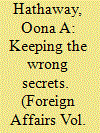

|
|
|
| 18 |
ID:
106574
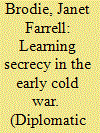

|
|
|
| 19 |
ID:
179217
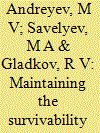

|
|
|
|
|
| Summary/Abstract |
The authors justify the need for techniques for reducing the detectability of airborne assaults in order to improve their survivability and to achieve a surprise effect in the adversary's rearguard. Certain approaches to solving this problem and a procedure for developing detectability reduction techniques for Airborne Forces (ABF) weapons and military hardware are proposed.
|
|
|
|
|
|
|
|
|
|
|
|
|
|
|
|
| 20 |
ID:
194585


|
|
|
|
|
| Summary/Abstract |
In early 2021, the European Parliament established the Frontex Scrutiny Working Group (FSWG) to monitor all aspects of the functioning of the European Border and Coast Guard Agency (Frontex). The FSWG organized a series of public hearings and carried out a ‘fact-finding’ investigation to gather information and evidence about pushbacks of refugees in the Aegean Sea. By unpacking some of the controversies that emerged during the hearings of the FSWG, I explore how secrecy was practised and strategically employed to obscure the responsibility of Frontex for the reported pushbacks, and how it was contested through the presentation of related evidence. I explain how secrecy and related controversies and struggles over making pushbacks public involve a variety of actors that enrol and interact with a heterogeneous set of objects, including digital, visual and archival traces of violence at sea, as well as databases used to record information about maritime incidents. I argue that secrecy regarding pushbacks is not just about keeping information about people and objects involved in security operations hidden. Secrecy is also produced through the selective recording, (mis)categorization and circulation of information in the name of transparency.
|
|
|
|
|
|
|
|
|
|
|
|
|
|
|
|
|
|
|
|
|